#but how much of that gets conveyed? how much of my narrative power
Explore tagged Tumblr posts
Text
i have lots of. thoughts about like why the wp as a project has turned out the way it has and lots of those thoughts are really good sweet ones about community and then lots of frustrations too i think
#ramblings#not gonna get super into it i don’t think#but i think the good stuff is really good#like it’s been absolutely bonkers amazing to get to see so many people#participate in making something so dear to them yk?#like we each brought a piece of ourselves to this and wove it in#in ways that are so intrinsic to the project that you can’t get them out#and then. i’m frustrated too#because of high school drama and how that splintered stuff#but also like. failure to communicate between parties waxing and waning interest#stepping on each others toes without regards#what ‘ownership’ over the project looks like and should look like#like i still want to write it. i feel like i am still writing it!#i want to do everything in my power to make it come true#but how much of that gets conveyed? how much of my narrative power#and power over decisions did i lose due to initial anxiety about getting in the way?#and then again. failure on all ends to really properly communicate what we were looking for#leaad to lots of varied conflicting and overlapping arcs that were never fully understood#n now some ppl r showing interest in writing it again which is GREAT! hi guys!!!#however i feel bad i guess? because we’ve spent time quite literally reworking all kinds of things#to make it fit because people stopped seeming to care?#so how do you say hey yeah ur character well i’ve just gone and developed them#and i want to give everyone the space to write because i want to hear everyone’s ideas and that really matters to me#and i don’t want my friends to see the finished project and be like hey wtf#this isn’t right#but like. hurgh#ANYWAYS SORRY#whittled pantheon#i love wp community. i miss thé wp community#‘not gonna get super into it’ GETS INRO IT
2 notes
·
View notes
Text
Disney's Wish
Look, Disney's Wish has been universally panned across the internet, and for good reason.
It’s just…kind of okay.
When we sit down to watch a Disney film—you know, from the company that dominated the animation industry from 1989 to (arguably) the mid 2010’s and defined the medium of animation for decades—we expect something magnificent. Now, I could sit here and tell you everything that I thought was wrong with Wish, but if you’re reading this review, then I imagine that you’ve already heard the most popular gripes from other users across the web. So, let me focus in:
The biggest problem with Wish—in fact, the only problem with Wish—is Magnifico.
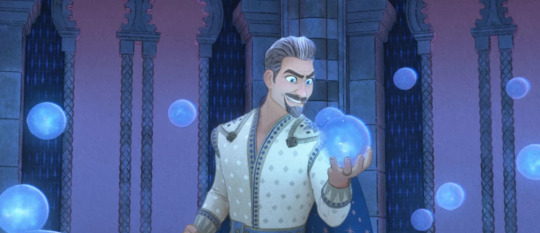
Whoa, that’s crazy! There’re so many things about Wish that could’ve been better! The original concept was stronger! The music was bad--
I hear you, I do. But stay with me here, okay? Take my hand. I studied under artists from the Disney renaissance. I teach an adapted model of Disney’s story pipeline at a University level. I spent a ridiculous amount of time getting degrees in this, and I am about to dissect this character and the narrative to a stupid degree.
First, we need to understand that a good story doesn’t start and end with what we see on the screen. Characters aren’t just fictional people; when used well, characters are tools the author uses (or in this case, the director) to convey their message to the audience. Each character’s struggle should in some way engage with the story’s message, and consequently, the story’s theme. Similarly, when we look at our protagonist and our antagonist, we should see their characters and their journeys reflected in one-another.
So, what went wrong between Asha & Magnifico in terms of narrative structure?
Act I
In Wish, we’re introduced to our hero not long into the runtime—Asha. She’s ambitious, caring, and community-oriented; in fact, Asha is truly introduced to the audience through her love of Rosas (in “Welcome to Rosas”). She’s surrounded by a colorful cast of friends who act as servants in the palace, furthering her connection with the idea of community but also telling us that she’s not of status, and then she makes her way to meet Magnifico for her chance to become his next apprentice.
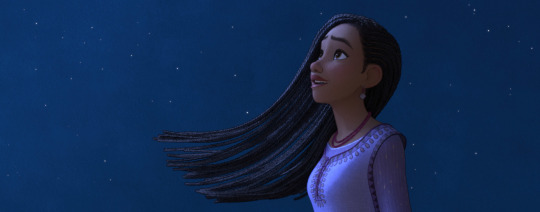
Quick aside: I'm not going to harp on Asha as a character in the context of Disney's overall canon. Almost every review I've seen covers her as a new addition to Disney's ever-growing repertoire of "Cute Quirky Heroines", and I think to be fair to Asha as an actor in the narrative, it serves her best to be weighed within the context of the story she's part of.
As Asha heads upstairs for her interview, we're introduced to the man of the hour: Magnifico. He lives in a tower high above the population of Rosas, immediately showing us how he differs from Asha; he’s disconnected from his community. He lives above them. He has status. While the broader context of the narrative wants us to believe that this also represents a sense of superiority, I would argue that isn’t what Magnifico’s introduction conveys; he's isolated.
Despite this distance, he does connect with Asha in “At All Costs”. For a moment, their goals and values align. In fact, they align so well that Magnifico sees Asha as someone who cares as much about Rosas as he does, and almost offers her the position.
… Until she asks him to grant Saba’s wish.
This is framed by the narrative as a misstep. The resonance between their ideals snaps immediately, and Magnifico says something along the line of “Wow. Most people wait at least a year before asking for something.”
This disappointment isn't played as coming from a place of power or superiority. He was excited by the idea of working with someone who had the same values as he did, who viewed Rosas in the same way he does, and then learns that Asha’s motivations at least partially stem from a place of personal gain.
Well, wait, is that really Asha's goal?
While it's not wholistically her goal, it's very explicitly stated & implied that getting Saba's wish granted is at least a part of it. The audience learns (through Asha's conversation with her friends before the interview) that every apprentice Magnifico has ever had gets not only their wish granted, but the wishes of their family, too! Asha doesn’t deny that this is a perk that she’s interested in, and I don't think this is a bad thing.
So, Is Asha’s commitment to Saba selfless, or selfish? I’m sure the director wanted it to seem selfless, wherein she believes her family member has waited long enough and deserves his wish granted, but we can’t ignore the broader context of Asha essentially trying to… skip the line.

Then, we get our first point of tension. Magnifico reveals his “true colors” in snapping at Asha, telling her that he “decides what people deserve”. This is supposed to be the great motivator, it’s meant to incite anger in the audience—after all, no one gets to decide what you deserve, right? But unfortunately for the integrity of the film and the audience's suspension of disbelief, at least part of Magnifico’s argument is a little too sound to ignore:
Some wishes are too vague and dangerous to grant. Now, there’s visual irony here; he says this after looking at a 100 old man playing the lute. The idea that something so innocuous could be dangerous is absurd, and the audience is meant to agree.
... But we’ve also seen plenty of other wishes that might be chaotic—flying on a rocket to space, anyone? The use of the word vague is important, too—this implies wording matters, and that a wish can be misinterpreted or evolve into something that is dangerous even if the original intent was innocuous. His reasoning for people forgetting their wish (protecting them from the sadness of being unable to attain their dreams) is much weaker, but still justifiable (in the way an antagonist’s flawed views can be justified). The film even introduces a facet of Magnifico’s backstory that implies he has personal experience with the grief of losing a dream (in the destruction of his home), but that thread is never touched on again.
What is the audience supposed to take from this encounter? If we’re looking at the director’s intent, I’d argue that we’ve been introduced to a well-meaning young girl and a king who’s locked away everyone’s greatest aspiration because he believes he deserves to have the power to decide who gets to be happy.
But what are we shown? Our heroine, backed by her friends, strives to be Magnifico’s apprentice because she loves the city but also would really like to see her family's wishes granted. When this request is denied and she loses the opportunity to be his apprentice, she deems Magnifico’s judgement unfair & thus begins her journey to free the dreams of Rosas’ people.
In fairness, Magnifico doesn’t exhibit sound judgement or kindness through this act of the film. He’s shown to be fickle, and once his composure cracks, he can be vindictive and sharp. He's not a good guy, but I'd argue he's not outright evil. He's just got the makings of a good villain, and those spikes of volatility do give us a foundation to work off of as he spirals, but as we’ll discuss in a bit, the foreshadowing established here isn’t used to the ends it implies.
While I was watching this film, I was sure Magnifico was going to be a redeemable villain. He can’t connect with people because he's sure they value what he provides more than they value him (as seen in “At All Costs” and the aftermath), and Asha’s asking for more was going to be framed as a mistake. His flaw was keeping his people too safe and never giving them the chance to sink or swim, and he's too far removed from his citizens to see that he is appreciated. Asha does identify this, and the culmination of her journey is giving people the right to choose their path, but the way Magnifico becomes the “true” villain and his motivations for doing so are strangely divorced from what we’re shown in Act I.
Act II:
His song, “This is the Thanks I Get!?” furthers the idea that Magnifico’s ire—and tipping point—is the fact that he thinks the people he’s built a kingdom for still want more. Over the course of this 3:14 song, we suddenly learn that Magnifico sends other people to help his community and doesn’t personally get involved (we never see this outside of this song), and that he’s incredibly vain/narcissistic (he's definitely a narcissist). I think feeling under-appreciated is actually a very strong motivation for Magnifico as a character-turning-villain, and it works very well. It’s justified based on what we’ve seen on screen so far: he feels under-appreciated (even though he’s decidedly not—the town adores him), he snaps and acts irrationally under stress (as seen with his outburst with Asha), and he’s frustrated that people seem to want more from him (again, as seen with his conversation with Asha in Act I).
But then… he opens the book.
Ah, the book. As an object on screen, we know that it's filled with ancient and evil magic, well-known to be cursed by every relevant character in the film, and kept well-secured under lock and key. But what does it stand for in the context of the narrative's structure? A quick path to power? We're never told that it has any redeeming qualities; Magnifico himself doesn't seem to know what he's looking for when he opens it. It feels... convenient.
I think it's also worth noting that he only turns to the book when he's alone; once again, the idea of connection and community rears it's ugly head! Earlier in the film, Amaya-- his wife-- is present and turns him away from taking that path. In her absence, he makes the wrong choice.
This decision could make sense; it contains powerful magic, and if it were framed in such a way that the people of Rosas were losing faith in Magnifico’s magic, as if what he can do might not be enough anymore after what they felt from Star, going for the book that we know contains spells that go above and beyond what he can already do would be logical. Along the lines of, “If they’re not happy with what I do for them, fine. I, ever the “martyr”, will do the unthinkable for you, because you want more.”

It would keeps with the idea that Magnifico believes he's still trying to help people, but his motivation has taken his self-imposed pity party and turned it into resentment and spite.
But, that’s not the case. Instead he talks about reversing that “light”, which has had no real negative or tangible consequences on Rosas. Everyone had a warm feeling for a few seconds. Again, it’s meant to paint him as a vain control freak, but… he hasn’t lost any power. The citizens of Rosas even assume the great showing of magic was Magnifico.
Act III
Then, we get to the consequences of opening the book (and perhaps my biggest qualm with this film). The book is established as being cursed. Magnifico knows it, Asha knows it, and Amaya—who is introduced as loyal-- knows it. The characters understand his behavior is a direct result of the book, and search for a way to save him. This is only the focus of the film for a few seconds, but if you think about it, the fact that his own wife cannot find a way to free him of the curse he’s been put under is unbelievably tragic. Worse still, upon discovering there is no way to reverse the curse, Magnifico—the king who built the city & “protected it” in his own flawed way for what seems to be centuries—is thrown out by his wife. You know, the wife who's stood loyal at his side for years?
It’s played for laughs, but there’s something unsettling about a character who’s clearly and explicitly under the influence of a malevolent entity being left… unsaved. If you follow the idea of Magnifico being disconnected from community being a driving force behind his arc, the end of the film sees him in a worse situation he was in at the start: truly, fully alone.
They bring in so many opportunities for Magnifico to be sympathetic and act as a foil for Asha; he’s jaded, she’s not. He’s overly cautious (even paranoid), she’s a risk-taker. He turns to power/magic at his lowest point, Asha turns to her friends at her lowest point. Because this dichotomy isn’t present, and Magnifico—who should be redeemable—isn’t, the film is so much weaker than it could’ve been. The lack of a strong core dynamic between the protagonist and antagonist echoes through every facet of the film from the music to the characterization to the pacing, and I believe if Magnifico had been more consistent, the film would’ve greatly improved across the board.
I mean, come on! Imagine if at the end of the film, Asha—who, if you remember, did resonate with Magnifico’s values at the start of the film—recognizes that he's twisted his original ideals and urges him to see the value in the people he’s helped, in their ingenuity, in their gratitude, & that what he was able to do before was enough. Going further, asking what his wish is or was—likely something he’s never been asked— and showing empathy! We’d come full circle to the start of the film where Asha asks him to grant her wish.
Pushing that further, if Magnifico’s wish is to see Rosas flourish or to be a good/beloved king, he'd have the the opportunity to see the value in failing and how pursuing the dream is its own complex and valuable journey, and how not even he is perfect.
The curse and the book (which, for the purposes of this adjustment, would need to be established as representing the idea of stepping on others to further your own goals/the fast way to success), then serve as the final antagonist, that same curse taking root in the people of Rosas who’ve had their dreams destroyed, and Asha works with the community to quell it. Asha’s learned her lesson, so has Magnifico, and the true source of evil in the film—the book—is handled independently. Magnifico steps back from his role as King, Amaya still ends up as Queen, and Asha takes her place as the new wish-granter.
This route could even give us the true “Disney villain” everyone’s craving; giving the book sentience and having it lure Magnifico in during “This is the Thanks I Get!?” leaves it as its own chaotic evil entity.
All in all, Magnifico's introduction paved a road to redemption that the rest of the film aggressively refused to deliver on, instead doubling down on weaker motivations that seem to appear out of thin air. Once the audience thinks, hey, that bad guy might have a point, the protagonist has to do a little more heavy lifting to convince us they're wrong.
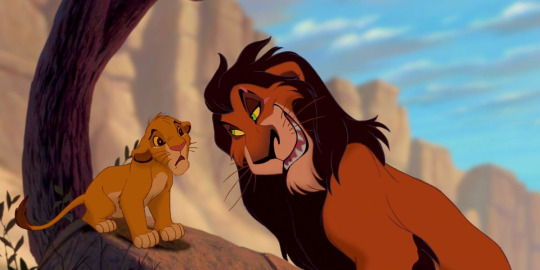
Look at the big-bad-greats from Disney's library. There isn't a point in the Lion King where we pause and think, "Wait a second, maybe Scar should be the guy who rules the Pridelands." Ursula from the Little Mermaid, though motivated by her banishment from King Triton's Seas, never seems to be the right gal for the throne. Maybe Maleficent doesn't get invited to the princess's birthday party, but we don't watch her curse a baby and think, Yeah, go curse that baby, that's a reasonable response to getting left out.
What do they all have in common? Their motivation is simple, their goal is clear, and they don't care who they hurt in pursuit of what they want.
Magnifico simply doesn't fall into that category. He's motivated by the idea of losing power, which is never a clear or impactful threat. His goal at the start seems to be to protect Rosas, then it turns into protecting his own power, and then-- once he's corrupted-- he wants to capture Star. The problem is, there's no objective to put this power toward. Power for power's sake is useless. Scar craves power because he feels robbed of status. Ursula believes the throne is rightfully hers. Maleficent wanted to make a statement. Magnifico... well, I'm not really sure.
1K notes
·
View notes
Text





˚☽˚.⋆ favourite writers
@moonstruckme
@ellecdc
@luveline
@sunnami
@crescenthistory
@unconventional-lawnchair
@iamgonnagetyouback
˚☽˚.⋆ favourite fics
Someone You Loved - @bobluvbot
Your relationship with Sirius hurt so much, that the only way forward was to forget.
This was the first fic I thought of when compiling this list. Words truly can't explain the feelings that I have, but I'll do my best :) It's absolutely breathtaking in its emotional depth and storytelling finesse. From the very first line, it draws you into a world of tender vulnerability and aching love. It's so beautifully crafted and executed, with each scene building on the last to create a narrative that feels as natural as it is compelling. The pacing is also spot-on, giving the emotional beats the room to land while steadily moving the plot forward. And don't get me started on the storyline; it's so heartfelt and bittersweet, weaving themes of loss, healing, and love in a way the feels so deeply personal. It doesn't shy away from the complexities of emotions, instead embracing them fully to create a story that lingers with you long after you've finished reading (I say this after MONTHS of failing to get over this fic). One thing that makes it so captivating is the way it captures the quiet moments—the unsaid words, lingering touches—that speak volumes. Additionally, the characterisation is stunning. The emotions of the characters are so raw and real that you can't help but be swept up in their journey. The way Dani balances the pain and hope is truly masterful, creating a dynamic that feels authentic and deeply moving. It's in the smallest details—the expressions, the gestures, even the silences—that the characters truly come alive, making their emotions feel almost tangible. Overall, this fic is a masterpiece of quiet intensity. It's not just a story—it's an experience that grips you by the heart, breaks it, and then carefully stitches it back together. I can only pray to the heavens above that there is a part two.
The Way I See You - @g1rld1ary
You're an artist, but you never let any of your friends see your work. They finally attend one of your exhibits and see your feelings on paper.
Again, one of the first fics I thought of when compiling this list. It's a beautifully tender exploration of love, self-perception, and quiet acceptance. From the first moment, it captivates you, drawing you into a story that feels both deeply personal and universally relatable. The pacing is gentle yet purposeful, allowing each emotional beat to resonate fully while weaving together a narrative that keeps you wholly invested until the very last word. The storyline is a masterclass in subtlety and emotion, perfectly capturing the struggles of vulnerability and self-doubt while showing the transformative power of love (sappy, I know, but true). The way Gia is able to build the relationship is nothing short of magical (hehe)—it's not rushed or overly-dramatic but instead grows organically through meaningful conversations, thoughtful actions, and quiet moments of connection and vulnerability. Remus is portrayed with such depth and nuance that you can't help but fall in love with him, and the reader's perspective is equally as compelling, making their emotions feel raw and real. The dynamic between them is so beautifully balanced, filling with an unspoken understanding and a tenderness that feels comforting and inspiring. What I love most about this fic is its ability to convey so much through the little things—soft touches, lingering looks, and words that carry weight far beyond their surface meaning. It's a story that feels intimate and personal, like it was written just for you. It's the kind of fic that stays with you, a quiet reminder of how love can be a healing force. It’s heartfelt, gorgeously written, and brimming with the kind of warmth that makes you want to read it over and over again—which I have :)
We Can't Be Friends (wait for your love.) - @sunnami
A joke about Remus having cute kids gets away from you in the best way.
An absolute masterclass in the subtle tension and emotional complexity of a poly relationship. The slow-burn of this story is one of its greatest strengths, and the way it unfolds allows each of the Marauders to shine individually while also showing the deep connections between them. The alternating dynamics between the reader and each of the Marauders—whether it's the tenderness, the playful teasing, or the quiet understanding—feels organic and never forced. You get a real sense of their relationships with the reader, as well as the unique chemistry each character brings to the trio. The storyline itself is deeply emotional, masterfully exploring each character and their own fears and hesitations, but ultimately supporting one another. Not only that, but the pacing is flawless, allowing space for the characters to work through their doubts and understandings, making the eventual culmination of their feelings all the more satisfying. The emotional stakes of this fic are heightened by the poly dynamic, and it’s this aspect that gives the relationships such rich depth. The way the characters handle their growing feelings for each other—dealing with jealousy, communication, and discovering how their bond can work—feels real and raw. But what really stands out to me is how each Marauder’s unique traits complement the others. Whether it’s James’ boldness, Sirius’ charm, or Remus’ quiet understanding, their interactions are electric, and you can feel the genuine affection they have for one another. There’s a sweetness to how they come together, each step in their journey feeling more intimate and grounded in trust and understanding. The ending is the perfect balance of emotional payoff and hope. It captures the essence of relationships—complex, imperfect, but filled with love—and leaves you with a sense of warmth and contentment. I re-read this fic so many times it's unhealthy.
Bless the Telephone - @777heavengirl
James Potter is positively useless with muggle technology, doesn't matter how much Remus tries to teach him, James cannot seem to grasp it— even the telephone. It’s not so bad though— At least he met you
This series is just an absolute gem—sweet, nostalgic, and just brimming with charm. It's barely just begun, but I'm so excited to read what's next! It strikes the perfect balance between lighthearted fun and deeper, emotional beats, creating a story that feels complete yet leaves you wanting more. Every interaction feels meaningful, whether it’s the playful banter that leaves you grinning, or the quieter moments of vulnerability that tug at your heartstrings. James Potter as a character is written to perfection; his charisma practically leaps off the page, but it's his softer, more tender side that truly shines. His and the reader's dynamic is so well-crafted that you can't help but root for them from the start. What I love most about it is how effortlessly it captures the warmth and excitement of falling in love. It's the little moments—the playful teasing, the stolen moments and unspoken emotions—that make it feel so real and relatable. It feels like being wrapped in a warm blanket.
You Woke Me Up For This? - @crescenthistory
Barty is bored in the middle of the night, so of course he goes to you.
Carina is a favourite for a reason—showcased by how difficult it was to choose only one fic. But this fic is an absolute delight— a perfect mix of humour, tenderness, and moments to give you butterflies. It's sharp and intentional, with a pacing that keeps you engaged from start to finish. Each scene is crafted so well, creating a soft and seamless flow that pulls you into the story while allowing the humour, emotion, and vulnerability to shine. The storyline is simple but so brilliantly executed; thriving on the charm of its characters and the intimate hilarity of their interactions, building a warm undercurrent of affection. What I adore about and serves as a testament to Carina's writing ability is the way it turns a seemingly mundane situation into something so endearingly extraordinary, layering humour and and heart in a way that feels both naturally and deeply satisfying. It has many strengths, but one of the fic's greatest is its character dynamics. The banter is somehow sharp and witty while perfectly balancing with the moments of genuine vulnerability that catch you off guard in the best way. The dialogue also feels so alive in a way that it manages to capture the personalities of the characters so vividly that you can practically hear their voices and guess their next reaction. What truly sets it apart is how it manages to intertwine the comedic and the heartfelt so seamlessly. The humour serves it's purpose masterfully without undermining the emotion, and the tender moments never feel out of place amidst the humour. It's a story that leaves you smiling—not only because it's funny, but because it's brimming with an endearing warmth and charm.
Morose Manatees - @ellecdc
James is told to leave barty x potter!reader alone.
Difficult to choose only one from Elle, but it has to be a Barty one for me, and this one is my favourite. It's a perfect mix of humour, affection, and heartwarming emotional beats, all centred around an unlikely yet perfect pairing. It moves so seamlessly between lighthearted banter and deeper, meaningful conversations while keeping the tone playful and engaging. What I love is how the dialogue showcases the character's personalities and quirks so effortlessly, especially the way they interact with each other—light, teasing, yet full of care. The storyline itself is full of charm and unexpected sweetness. The absurdity of the manatee discussion serves as a perfect backdrop for showcasing the growing affection between Barty and the reader, and as a wider representation of their relationship as a whole. James' perspective adds an extra layer of humour, with his frustration and eventual reluctant acceptance adding a perfect contrast to the lovey-dovey moments between Barty and the reader. The interactions between James and Regulus are just as compelling, with Regulus providing the right balance of humour and emotional depth as he offers his candid observations on love and loyalty—almost like a reflection of reader and Barty. What makes this fic so special is the way it portrays love—quiet, patient, and tender (the kind of love I want). Barty’s devotion to the reader is so evident, and the fic never shies away from showing how truly devoted he is, even in the smallest gestures. Whether it’s holding hands, softly kissing knuckles, or engaging in a bizarre but sweet conversation about aquatic creatures, the emotional connection between them is palpable and heartwarming. An adorable representation of tender love that leaves you smiling and wishing for your own Barty.
A Christmas Special - @moonstruckme
After Christmas Eve at Remus' flat, thick snowfall prevents you from going home. He's more than happy to host you.
You cannot have a Marauders 2024 favourites list without including Mae, it's just which one to choose! I'm settled and happy with my choice—one that represents Mae's writing brilliantly. Now, where do I begin with this fic? It's pure magic. What truly stands out is the narrative flow—it feels like one big scene as each one flows seamlessly into the next, which creates this beautiful narrative that feels cohesive yet dynamic. Not only that, but the pacing is masterful, giving the moments of quiet intimacy the room to breathe while keeping the plot moving forward so brilliantly. Similarly, the storyline itself is a beautiful blend of festive fluff and heartfelt emotion. It balances that carefree happiness with deeper, more personal connections, making each interaction feel layered and meaningful. But Mae's attention to subtle intimacy and overall detail is what makes this story truly shine. From the small gestures that speak volumes to the way the setting is described with such vividness and clarity, it feels as though you're in the story with them. What I love most, however, is how the character's dynamics are brought to life and feel more than words on a page. Their chemistry radiates—not in a forced or overly-dramatic way, but through the kind of subtle, unspoken moments that leave you smiling and kicking your feet like an idiot. There's a particular sweetness in how the characters navigate their feelings, blending playful banter with quiet and tender vulnerability that is written so excellently it feels like you're moving along with them. All of Mae's skills I feel are fully encapsulated in this one fic—to the point where I've just barely scratched the surface as to why I love it so much (I could write an essay with references and everything), but I think I've put my point across enough for now :)

#marauders#sirius black#remus lupin#james potter#barty crouch junior#barty crouch jr#ailoda's recs#marauders era#marauders era fic recs#marauders fic recs#regulus black#sirius black x reader#sirius black x you#sirius black x y/n#james potter x reader#james potter x you#james potter x y/n#remus lupin x reader#remus lupin x you#remus lupin x y/n#barty crouch jr x reader#barty crouch junior x reader#barty crouch jr x you#barty crouch junior x you#barty crouch jr x y/n#barty crouch junior x y/n#regulus black x reader#regulus black x you#regulus black x y/n
314 notes
·
View notes
Text
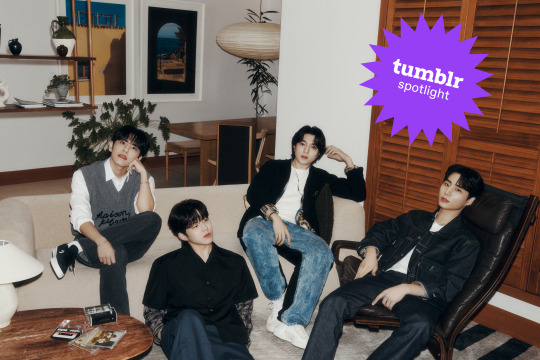
K-Pop Spotlight: DAY6
Come one, come all to a K-Pop Spotlight that is sure to dazzle and delight ’til the final curtain. This week, all eyes are on DAY6 following the release of their eighth mini-album, Fourever, and brand new title track, "Welcome to the Show." We caught up with the band to discuss their goals as they approach their 10th anniversary and their ever-growing connection to their fans through their music. Check out our full interview below!
Tracks like “Welcome to the Show,” “The Power of Love,” and “Get The Hell Out” seem to have very different themes. Can you tell us a little about how these songs relate to each other and what aspects make this album cohesive?
SUNGJIN: As we pursue the idea of being a 'band that sings every moment,' it seems like our albums, including the recent one, prioritize diversity in songs and situations rather than unity. Consequently, our albums contain various genres and narratives. However, there seems to be a commonality in most songs, depicting situations that everyone has either gone through or might experience.
Young K: First and foremost, I would say this album is a compilation of the best songs we could create. There's definitely a theme of love running through it. "Welcome to the Show," "The Power of Love," and "Get The Hell Out" all talk about the concept of love.
What goes into creating titles for DAY6 songs and albums, especially those that don’t come directly from your lyrics? Do you find it hard to condense the intentions and themes of a song into a title?
Young K: While there have been cases like that, all the songs on this album came from the lyrics. Sometimes, when choosing a title, we select the one that best describes the song—other times, we choose to give it a twist or make it more intriguing.
WONPIL: Naming songs involves a lot of deliberation. We often contemplate which title will catch the eye and capture the song's essence. Usually, we try to take it from a verse in the chorus. This can be a challenging part of the songwriting process.
Is there a creative project you’ve always wanted to work on but haven’t gotten the chance/found the time?
SUNGJIN: I'm very curious, and have a principle of "trying to experience as much as possible." There are so many things I want to try musically and personally, especially among the things I know but haven't tried yet.
DOWOON: I hope we can have a song that we can collaborate on with My Day, like a choir.
What does your work/studio setup look like? Where do you feel the most creatively inspired?
DOWOON: We try to keep the studio as tidy as possible and make it comfortable for practice sessions.
WONPIL: When working on songs, we talk a lot. We get inspiration from little conversations, joking around, sharing stories, and listening to music from various eras regardless of genre while giving opinions. We also try to build emotional connections with the songs. There’s a lot of communication going on. The songwriting process takes place in the studio of our long-time collaborator, composer Hong Jisang, with whom we've been working together since our debut.
How do you want to evolve as a musician/producer?
Young K: I want to be eagerly anticipated and awaited as an artist. Without those who wait for us, we wouldn't release or even step onto the stage. So I’m always thankful for My Day.
WONPIL: My biggest goal is to make good music for My Day and the public, so I think I'll continue to ponder. When working on songs, I pour my sincerity into them. I constantly strive to express this sincerity musically, fully capturing the emotions I want to convey. I hope to create songs that can still be listened to even after 10 or 20 years.
Design your own Tumblr blog: choose an aesthetic, a blog name, and would you be a frequent poster or lurker?
SUNGJIN: I think I’ll use it to catch up on friends' updates. For the blog name, THUMB BLUR sounds good to me. I might end up being a lurker who never posts.
DOWOON: Maybe a blog for plants? I think I'll post it like a diary.
Want more DAY6? Check out their new mini album Fourever and the music video for the title track “Welcome to the Show,” both out now!
675 notes
·
View notes
Note
i have had like 10 friends rec worm to me but nobody’s given me a good like, gist of its vibe and what its abt because ‘its best blind’, could u please give a like brief summary and vibe check of it 😭 it’s so long i dont wanna try and invest that much time without knowing much abt it
so, worm is a 1.7 million word long webserial written in 2010. 1.7 million words seems like a lot, but it was also written over a relatively short period of time, which means the writing style is very easy to parse--the ideas aren't without complexity, but the language itself isn't intimidatingly dense. you can get through it at a very decent pace. i agree with your friends that there are vast portions of worm that hit best when you're unspoiled, but the thing is that worm is long enough that giving you the basic plot pitch is in no way spoilers for any of the things that i wouldn't want to see spoiled for someone. i'm actually kind of baffled they're not telling you Any Thing, because it is in my estimation one of the best books i've ever read, but it also Needs a briefing before you get into it for like five different reasons. which i will now provide. i swear to god this is brief by my standards it's just that i am very thorough
worm is a story about superheroes and supervillains, set in a world where superpowers are traumagenic--rather than appearing randomly or innately, some people gain powers after a traumatizing event happens to them. the protagonist is taylor hebert, a 15yo girl who has the power to control insects and desperately wants to be a superhero. and then accidentally finds herself scouted by a team of teenage villains instead. who's to say how she's going to react to all that!
one of the most compelling things about worm is that the superpowers in it serve as visceral, hyper-literal metaphors for the trauma and traumatized coping mechanisms of the characters with those powers. each power is incredibly specific and thematically relevant to the person who has it, and it's incredibly interesting and evocative. it feels so natural and well-done that it comes off like how superpowers are just meant to be written.
the fact that superpowers stem from trauma also means that worm is fundamentally a narrative about trauma. specifically, about traumatized teenagers and the relationships they form as they cling together while struggling through growing up traumatized & mutually coping with an increasingly intriguing, intense, and far-reaching escalating plot. worm's depictions of trauma + mental illness--including unpalatable trauma responses, including traumatized characters who are allowed to be complicated and nuanced and messy while still receiving narrative respect--are deeply real-feeling and impactful, and they're placed in the context of a well-spun + engaging story.
i really do have to stress how excellent the character writing is. worm is fully deserving of being as long as it is. over the course of 1.7 million words of character development, the average reader's reaction to the main characters goes from "sorta interesting" to "okay, i want to see where this goes" to "augh...really likable" to "i am now on hands and knees crying and these characters are going to stick around in my brain forever." wildbow has incredible talent for efficiently conveying complicated, real-feeling, and viscerally evocative characterization. many of the interlude chapters (chapters written from the perspective of different characters other than taylor) are so interesting, fleshed-out, and emotionally affecting that they make you wish you could read an entire novel about just the side character being featured. with that level of characterization for just the side cast, it's not surprising that taylor (& co) are genuinely just downright iconic. and i do not say that lightly--taylor is truly one of the best-written protagonists i've seen in anything. ever.
the other main pitch-point for worm is that it's a fascinating deconstruction/reconstruction/examination of the conceits of the superhero genre. it answers the question of--what would the world have to be like, for people with superpowers to act the way they do in classic cape media? and it does this well enough that it's interesting even if you have only a passing familiarity with cape media. i am not a big superhero media fan, but worm addresses virtually every aspect of cape media that was under the sun around 2010 in a way that's so interesting i still find it incredibly engaging. the approach it takes makes the narrative very accessible even to people who aren't usually cape media fans.
and speaking of the narrative: the end of the story is coherent and satisfying and deeply thematically resonant*. the way worm follows through on all of its main mysteries & plot threads is excellent. you don't have to worry about getting thru 1.7 million words and being dissatisfied by the author shitting the bed at the end, or anything like that. he does an amazing job of weaving together plot events in a way that makes each successive one feel rationally, thematically, and emotionally connected to what came before. there's really only one part where i feel the story stumbles a bit, but i think it was the best option he had for the narrative, and it's by no means a dealbreaker. it's in fact really impressive how cohesive and satisfying worm is for such a long webserial released over such a brief period of time.
*this is subjective ive seen some people who didnt love it but ive never seen anyone who downright Hated it who didnt also demonstrate egregious misunderstanding of literally everything worm is about. so thats a good sign
as for the downsides of worm/things that might put you off:
there is a very long list of trigger warnings for it. if you have any trigger warnings you want you should ask your friends to let you know about the relevant parts, because the fact that it's About Trauma (& about typical cape media circumstances presented very seriously) means that traumatic and violent things & their realistic aftermath are constantly happening and/or being discussed. i would not classify worm as needlessly dark or spiteful to the audience by any means, but it is intense and covers a lot of heavy topics. i do assume if your friends are all recommending it to you, they think none of the material would be too much for you, though!
worm was written in 2010 by a white cishet guy from canada. it's typical levels of 2010-era bigoted, it has a deeply lesbophobic stereotype character, it has some atrociously racist stereotype characters, the author really hates addicts, It's Got Blind Spots. i think worm is generally fully worth reading despite these, but very fair warning that it can get bad. i think what exacerbates this is that worm is generally extremely nuanced & sympathetic regarding ideas such as "crime is a result of systematic circumstance vs people just being inherently evil" and "mentally ill people who are traumatized in unpalatable ways are still deserving of fundamental respect as human beings" and so on and so forth, so it's extra noticeable and insufferable when you get to a topic the author has unexamined biases on and all that nuance drops out. the worst part is that a lot of this is most concentrated in the early arcs, so you have to get through them without being super attached to any of the characters yet. it is worth it though.
worm like. Does have a central straight relationship in it. and it's a very well written straight relationship for the most part and i like it quite a lot. but worm also passes the bechdel test with such flying colors that it enters 'unintentionally homoerotic' territory. which means a lot of people were shipping the main character ms taylor hebert with her female friends while the story was being released. which caused the author to get so mad he 1. posted a word of god to a forum loudly insisting that all of the girls are straight and 2. inserted a few deeply awkward and obvious and out of character scenes where he finds an excuse for the girls to more or less turn to the camera and go "i'm not gay, btw. this is platonic." This is fucking insufferable, and will piss you off immensely, but then you will get to any of the number of deeply emotionally affecting scenes between them, and at that point you will be too busy sniffling piteously and perhaps crytyping an analysis post on tumblr to be mad about all that other shit. also they're only a couple tiny portions out of an entire overall fantastic novel
overall: if those points don't sound like dealbreakers (i hope they aren't they're really massively outstripped by the amount of devastatingly good moments in worm, worm still has a thriving fandom over a decade later for a reason), you should absolutely give it a shot and see what you think. my final note is that you have to read up until the end of arc 8 to really see where what makes worm Worm kicks in, so aim for at least there to see how you feel about it if you're just thinking about dipping your toes in vs fully committing. i hope that was helpful and not too long :)
oh and don't go in the comments section on wordpress if you don't want spoilers. or anywhere else in the fandom at all. you will be spoiled. quite possibly for things you could not even have imagined were topics to be spoiled on.
#ask#wormblr#parahumans#ill tag it to save it so i can reference later. and maybe other people will find it helpful
355 notes
·
View notes
Note
HFDOSN OMG YOUR ART IS SO LOVELY!!
I was wondering if you have any tips to rendering or the way you pick colours?? It's something I struggle with and yours are so vibrant and full of life!
HII I’m actually so happy to answer ur question! I work at the studio I took art classes at to help highschool kids learn the basics to art, so I love teaching a bit of art!!
Mind you, I’m still a younger artist, and I still have a lot to learn. And this is only talking about my style and my tastes! Make sure to look at how the true masters do it too! (My favorite master artists are Redum4, Octahooves, and Matchach on Twitter)
When it comes to rendering, values, and color, it’s all about balance and contrast.
For rending, (at least for my style) it’s all about lost and found edges. Balancing lost edges vs soft edges. Smooth vs textured, harsh vs porcelain.
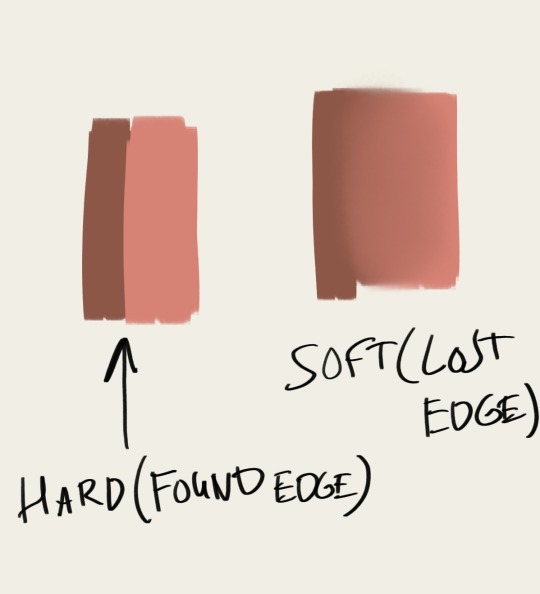
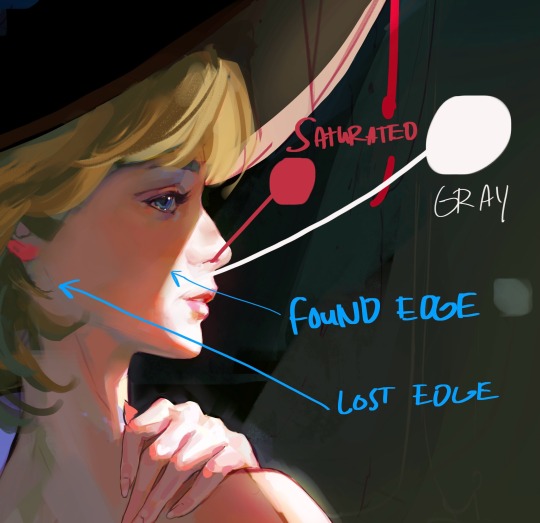
In my style, I see rendering as a way to convey character and mood. Lost edges equals softness and grace. Found edges equals harshness and severity.
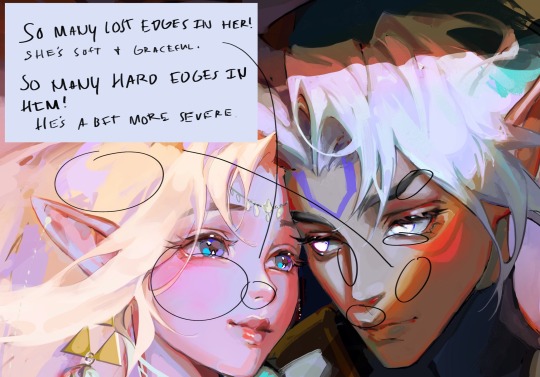
I utilize lost and found edges in this way! In other words, if you ignore balance (such as utilizing many found edges and hardly any lost edges) then give it a narrative/mood reason, I say! :3
But in terms of the basics, lost edges means a smooth surface, a smooth transition from light to dark (or transition of color). While found edges suggests a harsh transition from light to dark. ALSO and probably most importantly when it comes to edges in rendering: Found edges reels the eye in, creating focus. Lost edges typically lose the eye, creating a rest for our eyes. It’s important to balance them for these reasons too!
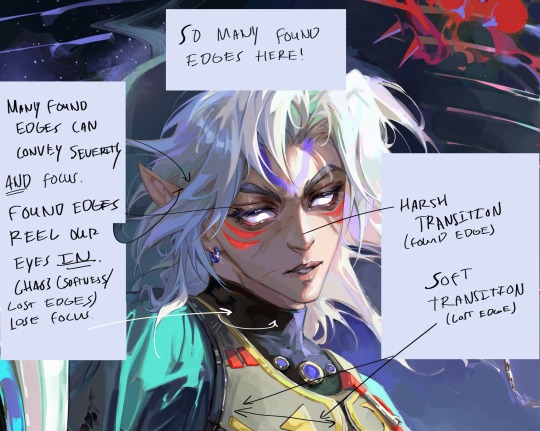
For colors, it’s all about THE GRAYS. (Ironically enough!) The basics of my coloring method can be described via this sphere:
Basically, a highly saturated color can only have its high saturation in the spotlight BECAUSE the gray tones make it pop by giving the eyes a break period saturation wise. All about contrast!
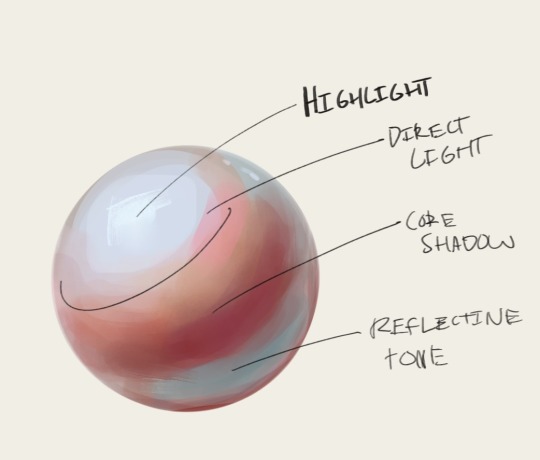
As you can see, I differentiate the colors and saturations by values. My shadows are deeply saturated, typically warm. (It’s more typical to make the lighter area warm and the shadows cool! But I find that vibrancy comes easier if you desaturated the light, make it colder, and really PUMP UP the saturation and heat in the shadows.) And the areas lit up are typically cooler and have hints of gray in them! This is great for conveying strong direct light (which is typical in my style), and it makes it look as if the light is so powerful it seeps through their skin. You can see how I do this in some of my work, I typically exaggerate these qualities in skin!
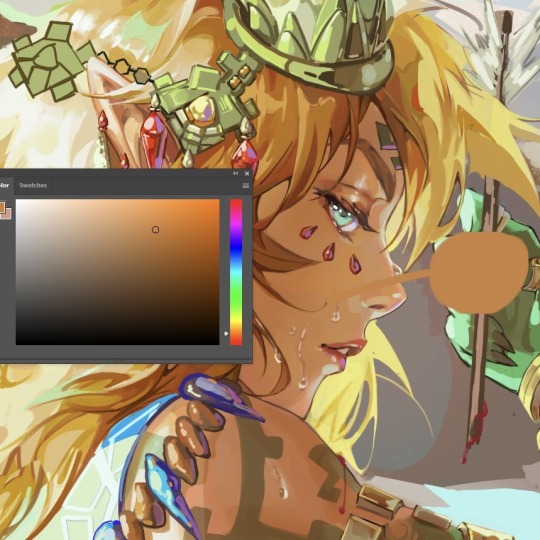
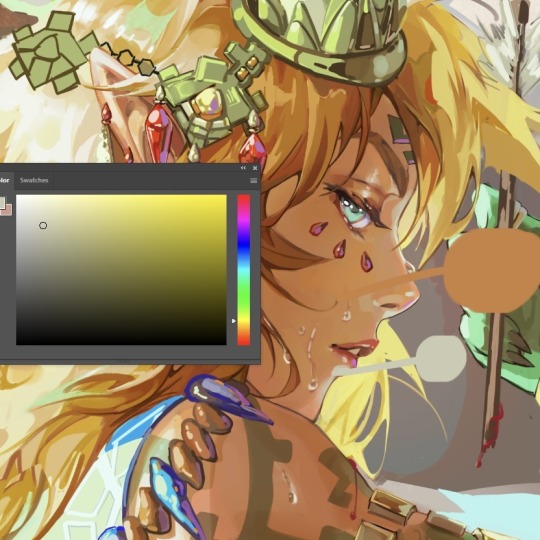
You can also do this especially well for skin with melanin!
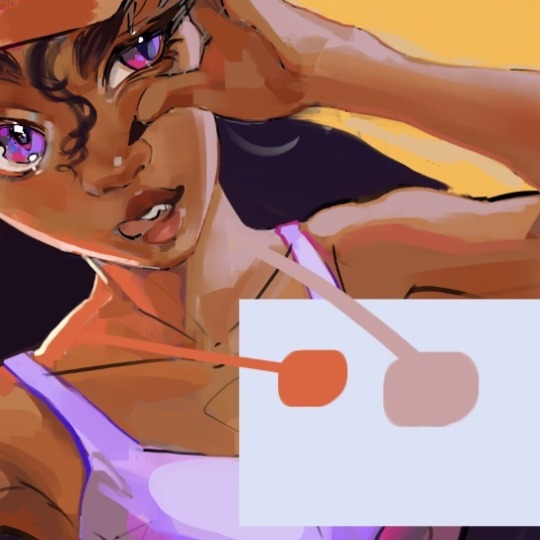
This also works especially well digitally, because saturation and value works in tangent in the color square! Pure white has no saturation, and the more saturation you add to pure white (the further right you go on the color square) the more value you get.
The use of grays are the most important thing when it comes to vibrancy, in my opinion! Too much saturation is, well, too much. Again, you can disregard this rule if you have a reason for it. Such as a high energy mood or overstimulation you’re trying to convey! Or desaturated to convey coldness, stillness, etc.
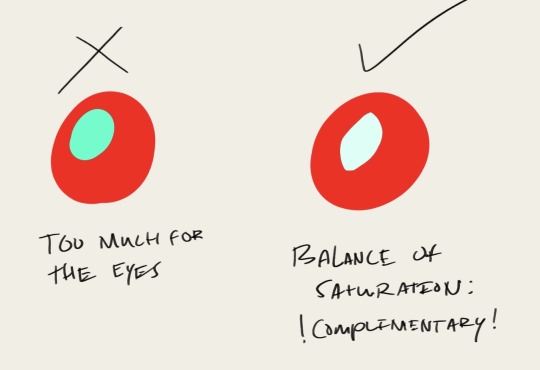
Anyways, I hope this made sense! (And sorry about it being more of an info dump than tip-giving >w<) If anyone wants clarification on anything, feel free to ask me in the comments! 🫶🏼🫶🏼
102 notes
·
View notes
Text
the best game of 2024 was an hour-long visual novel demo, and i can't tell you how it ends
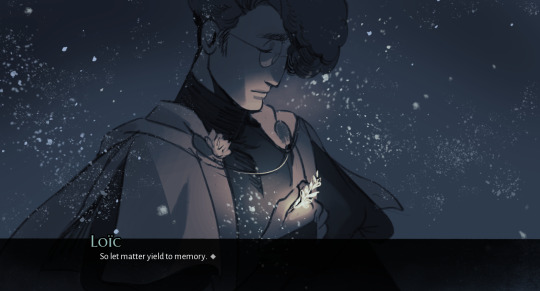
attack and dethrone god.
okay. oh my god. soul of sovereignty by ggdg (of lady of the shard & deltarune fame) is discounted for only a few more days, so i need to get this one out while the iron's hot.
so: i'm inviting you along on another journey. we're following a polite gentleman of the wizardly inclination (loïc) who is approached by a sickly woman in dire need (ysmé). all she requests, in her plea, is an escort to guide her to the nearby temple. his decision to support her may turn out to be the most important choice he ever makes.
... have you ever enjoyed the kind of narrative that traps two people with heavily contrasting motives and personalities together in an unbreakable contract? do you like stories of absolute devotion?
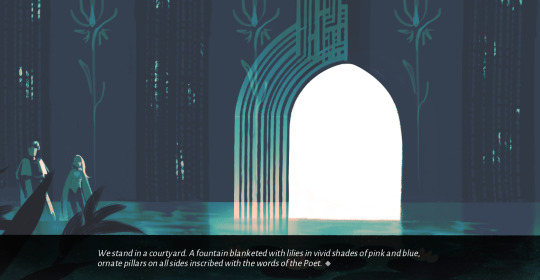
i could look at this shot forever ngl
... are you compelled by immersive speculative fantasy worlds where the use and study of magic heavily influences the rhythm of people's day-to-day lives?
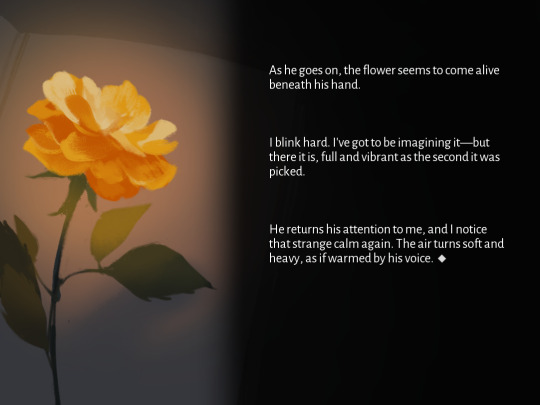
(really intriguing magical linguistics system going on here)
... do you ever promise too much of yourself to others, sometimes, even when it's a bad idea?
... if it was possible -- if you could -- would you abandon your humanity for the power to change your world forever?
and, whatever you may feel in your heart about the above...
do you want to see behind the eyes of a hot trans girl as she bullshits her way into a truly volatile level of power and influence and gets everything she wants?
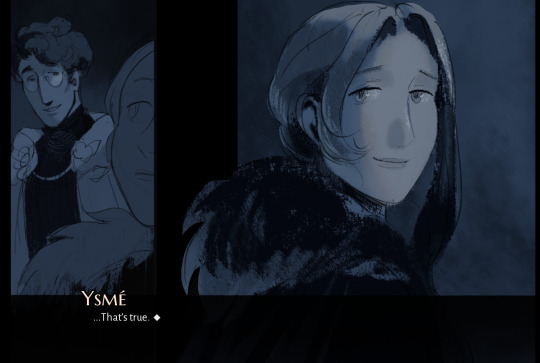
(+ her pet dilf lovely assistant)
if even one of these elicited a "yes," i think you'll love this story.
i'll go out of a limb:
i think, if you open up your heart, you'll find yourself falling for both of the leads. It's a game that really wants you to look at it from every angle, take it apart, and ask questions about loïc, ysmé, their stories, and what they believe to be true about the world and one another. subtext -- especially the charged subtext this story throws at you and hopes you'll piece together -- is a beautiful thing.
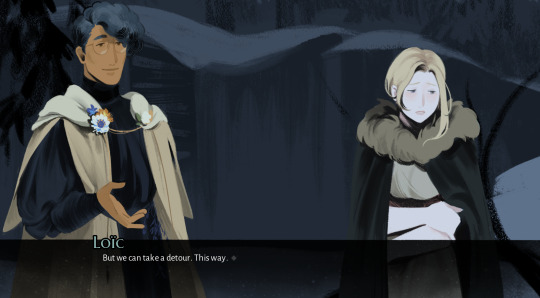
the number of talksprites in this demo is kind of staggering
the jrpg-inspired world of the mosaic and its surroundings is as vibrant as it is profoundly lonely, color folded into every facet of its character as you move through it. appropriately, it's really invested in a lot of questions that arise not just from high fantasy as a genre, but from the modern fantasy sensibilities of jrpgs and the interrogation of what divinity even means in a world where the gods are forces you can interact with and draw power from, however indirectly.
what can i even say? that gg and toby fox's collab score for the prelude is downright heavenly and made it onto my work playlist right alongside the deltarune ost the day it came out on bandcamp? that gg's art, especially their use of light, conveys every scene with vivid beauty?

i wouldn't be posting so much of it if i didn't want to eat every CG. oh my god. he's so pretty. it's not even fair
beyond all of that, i think the game's main resonance point with people is that gg's writing is genuinely thoughtful. they use art detail and deft character writing to convey everything about the leads, using the limited time you get with it to paint layers and layers of information on who these people are and why they make the decisions they do. soulsov's roughly an-hour-and-change of text, expressive talksprites, and lush CGs is infused with so much heart and so much horror and so much intrigue that it leaves you feeling like you're a part of this world, carried along for the ride right alongside the two leads. gg clearly really adores these two, and that level of passion makes everything loïc and ysmé do shine even brighter. in spite of (or perhaps because of) all their friction and flaws, they're easy to love.
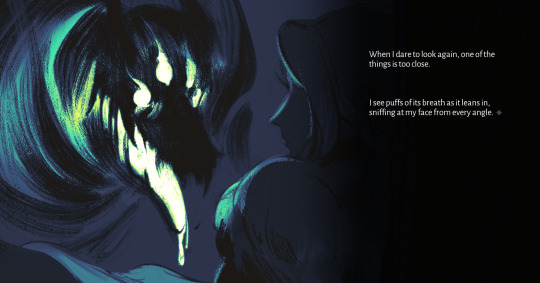
(it's really fun to read aloud as a script, too! ysmé's a hoot.)
i hope you experience it with high expectations and an open heart. i don't think it will disappoint. it is, perhaps, just a little bit magical.
i hope you see it through to the end!
#soulsov#soul of sovereignty#indie games#deltarune#long post#i'm not saying everything i want to say here but#i need you to discover the rest and leave a nice review#ok??#i love it
182 notes
·
View notes
Text
On one hand I'm shocked mouthwashing exploded so fast, and it's especially surreal seeing it go through the process of fandomization wherein ships and stickers and such start cropping up. Though, I have to hand it to Wrong Organ, it's a compelling experience.
I think part of what lends to its spread in fandom is its concise cast and potent imagery. The game gets a lot of mileage out of its metaphors, visual and otherwise, and people latch onto that HARD. If you can convey an emotionally heavy concept with a symbol alone (a bottle of mouthwash, a pony, a hibiscus, an axe...) you're recontextualizing the mundane. They're going to think of your story when they see mouthwash. When they see birthday cake. The conversation of a dead pixel, of all things, will ring around in mouthwashing player's heads for a long time. And these symbols are tied to the characters in different ways. Characters which have such strongly differing actions and motives behind them. Memorable characters, memorable visuals, memorable narrative—you're cooking the perfect storm for a fandom to spring up around your game because it's not only a good game, but it's a spreadable game. It's extremely fanart-able. Theory-able. People who haven't been introduced to mouthwashing will see the imagery and feel a sense of mystery. Why is that guy so severely burnt and bandaged? What's with the mouthwash? What does any of this have to do with ponies? It seeds intrigue. Then, people familiar with the themes get the satisfaction of being in-the-know and Getting It. They might introduce others to the game so they can also understand and discuss the themes together.
It rings familiar with NOPE's popularity. NOPE was great, of course that's why it's popular, but what I'm getting at is that it too made use of the power of symbols and metaphor to make its concepts really stay stuck in people's heads. And the artwork that fans made echoes this! The streamer trailing from the mouth of Jean Jacket, clouds and horses, the vertical shoe, the ufo imagery... If you've seen NOPE fanart you know what I mean! The mundane transformed! The most prominent afterimages bounced back and forth until they represent the whole.
And this isn't derogatory, it's fucking fascinating to me. How stories can impact schema. How powerful an image can be once you tie it to a feeling or an idea or a person. This goes deeper than fandom popularity or youtube analysis videos. Does that make any sense? I'm rambling but this pattern repeats so much and instead of being cynical about the predictability this time I want to appreciate the phenomenon itself. There's probably something to be said about symbols being extremely powerful throughout human history and culture but that's out of the scope of my unplanned "woah mouthwashing, am I right?" post here.
I leave you with these pictures, make of them what you will



106 notes
·
View notes
Text
Been also thinking about the line between "the text wasn't meant to be interpreted this way but it's a solid reading / line of critique (with caveats)" (#1) versus "the text wasn't meant to be interpreted this way and doing so actively worsens the story they're trying to tell" (#2).
Going to do some TDP specific examples.
But basically: When your in-depth reading takes away from the Surface Level reading rather than providing contribution, that's usually a good sign you're going into a story with 1) an expectation or reading that was never promised or 2) are weakening the story through a typically unfounded analysis.
A TDP specific example is the relationship between Viren and Harrow. Canonically, textually, they had a brotherly relationship, both in the dialogue that Viren conveys ("I think of you as my brother" / "You're my brother") and in their persistent parallel framing with Callum and Ezran.


However, that doesn't stop many fans (myself included) from reading a romantic and sexual attraction between Viren and Harrow, especially in their youth. Not only do they just have the vibes, parallels to other couples, and subtext, Viren very much places Harrow's importance in his life in a way that's usually reserved for lovers. Viren having been in love (or ongoing) just makes sense. That doesn't mean any of us are expecting TDP to ever make it Canon — like I said, it's canonically very much Not that — but it does add a layer to Viren always wanting to 1) matter to Harrow as much as he does, and 2) his frustration and severance with Harrow because he wasn't getting the acceptance and affection that he wanted.
This is what I would consider #1 avenue: it doesn't take away from their dynamic, and to me adds a layer, but it allows the text to stand as is. Viren wants Harrow's love and attention in the gradual and then sharp deterioration of their dynamic. All I'm changing is a little bit of the why per my personal reading.
Meanwhile, if I went the route of "Yeah I know canon shows Harrow appreciating, taking Viren into account, and smiling at / loving him, but I don't think Harrow cared at all and he was just a bad friend to Viren for years" then... Yeah I could read it that way — it's not as though Harrow or Viren were hardly perfect friends to each other, and Harrow's discard of Viren is harsh (even if it was a long time coming in a lot of ways) — but what does that leave me with? Frustration, maybe; a poor view of Harrow; immense sympathy towards Viren? At best, I'd maybe resent how Viren learns the lessons Harrow was trying to teach him by paying for it with his life; at worst, I'd think the narrative was being fundamentally unfair to Viren without recognizing that his previous modes of self sacrifice were always couched in ego, shirking the immediate consequences of being saved, or that he was routinely willing to sacrifice everyone around him first, including his own children.
This is where we get into area #2, and I see it happen all the time with TDP, whether it's from the series not portraying monarchies as a bad thing or the ever persistent "issue" of dark magic. Quite frankly, it's silly to walk into TDP post-S1 expecting dark magic to be anything beyond — given all the current textual evidence — "morally complicated" magic at best. Yes it can be used for good things, but that doesn't automatically make it good, and while we could spin logistical wheels for ages, the Point the story is Making with dark magic is about power, desperation, love, self-destruction, violation, and agency, and how all those things can overlap or counteract each other. Toting out "well I think dark magic is blanket statement Okay and Good actually" misses all of that, and actively makes your reading and experience with TDP worse. The surface level reading is important to take into account when examining a piece of media, otherwise it can lead to a very warped view and effect your ability to be well founded in your reading of the text.
That doesn't mean you can't desire a more morally neutral form of dark magic — plenty of fantasy series and stories have it, and some I adore (like "the legend of Zelda" — but it does mean accepting the story is never going to broadly speaking do that, and it's Okay that it won't. I'd be silly if I walked into LOZ expecting them to get into the ethics of its form of (non) dark magic of using monsters for spell parts because it's 1) a game mechanic and 2) it's not interested in the ethics of it, and no amount of me saying "well it should be" will change that, nor is it a Story Flaw that it doesn't.
This is all to say that I think asking "Why would the writers do this?" is one of the most useful, if basic, questions to ask when it comes to analysis and when figuring out whether your viewpoint is falling into avenue #1 of being grounded, or avenue #2 of veering towards warped territory.
For example, if I take Rayla not being by Callum's side when he's struggling over the pearl reveal in 6x06 as an indicator she doesn't care about him, I'm doing a deep dive that ignores all the very Surface Level emphasized scenes of Rayla caring about and supporting Callum a whole lot. I could make the claim she doesn't care based on that scene, but it wouldn't be well founded because it's ignoring miles of other much more prevalent, consistent scenes of her being there for him; it's not a well founded claim.
For something less obvious, let's look at 5x08. While Callum could've given Finnegrin the wrong spell on purpose, as some fans have thoughtfully proposed, as a sneaky wink for die hard fans... why would the authors do that? What does the story gain from that reading or intention? Well, it makes it seem like Callum was less desperate in his dealings with Finnegrin, which makes him doing dark magic afterwards come off worse. It also lessens the battle Callum has throughout that episode for feeling in control and recognizing that he can't always be. It's a reading that, in my opinion, not only strays away from the surface level reading, but is one removes elements from the text that the text would otherwise be stronger for having. In comparison, after all, if Callum gave his version of the right spell without thinking it through, he did so entirely out of desperation, which better affirms just how desperate and worn down he had to be to do dark magic, and is another instance in the episode of him feeling very much out of control (especially since we don't see the 3rd with dark magic on screen, so otherwise, we'd only have him punching Finnegrin as an example and nothing else).
Same thing with the old (now debunked) theory of Callum's bio dad being elven in nature. It's an interesting idea, exploring the implications and backstory and how'd grapple with it, but it'd weaken what canon is actively striving for, which is that Callum's magic use is special precisely because he's an ordinary human who's gained primal magic, and having elven ancestry would counteract that. It doesn't mean that the idea isn't a Good one or that it's not fun to explore in fanon, but there's a lot of reasons the story isn't (or decided not to) have it be canon, because it was stronger for the story they Wanted to tell for it not to be.
Sometimes, as fans this means acknowledging that what we want or prefer in a story is just blatantly not what's being set up, because the story is going to do things regardless of what we want or personally like. That doesn't mean those decisions are bad, and it also doesn't mean those elements or decisions or constructions are beyond critique, but it does mean to ask yourself some key questions:
Is there anything my reading is missing? (ie. if TDP shouldn't have monarchs and that's the critical focus, we lose the messages about leadership, family, and legacy that are engaged with through the vessel of hereditary monarchy)
Why might the story or scene go in certain directions? Are there story constraints (time, tone, etc) they have to abide by?
Am I expecting the story to ascribe to my worldview or preference, and am I open to things that don't do that? If yes, why? If no, why not?
Is my in-depth takeaway aligned with a surface level reading? Are both readings working together, or are they opposed? What other surface level readings might be plausible here for a casual viewer?
Even if this is not personally compelling and/or believable to me, does my personal takeaway match up with the characters' responses to it? Why or why not? (Think every Disney movie where they fall in love in 3 days. Realistic? No. Does it matter within the context of the story? Also no)
Again, this is not to say that 1) what the casual takeaway Is is an objective singular monolith (it isn't) or 2) if the casual takeaway and your interpretation is at odds that you're wrong. But through context clues, we can usually narrow it down as to what the story intends, and that if our interpretations do veer heavily to examine why and to manage expectations accordingly.
Anyways hopefully this all made sense Viren x Harrow forever
78 notes
·
View notes
Note
can you talk more about what you like about hypnospace outlaw? i love that game but i thought it was more a cute fun time than an exceptional narrative, im surprised to see it as your top 5 game of all time
i guess the "main story", if you can call it that, is--i agree with you--not an exceptional narrative. but, like, i think the stories that matter in hypnospace outlaw are the individual stories of the people who make their little pages, and those stories are not only wonderful but conveyed incredibly. hypnospace outlaw is about seeing the digital footprints people leave, about learning about other people's passions, about exploring a social space and realizing there's all kinds of people in the world. it's a story that speaks to me a lot and my early experiences on the internet--there is such a powerful feeling of connection and intimacy with its characters achieved just through these little webpages, in little choices like how they decorated them, and there's so much attention put into all the little details of that. & the fact that you don't even get to interact with these people just makes it stronger to me, gives it this bittersweet melancholy edge (best encapsulated by the unbelievably good theme song).
it makes me remember being a kid online and making my lame little forum posts but also makes me reminisce on my time online now, on what someone might think of me if they only saw my blog. it speaks to these asymmetrical strange moments of connection, of finding some weird website about frogs someone's maintained since 1997. it's more than just nostalgia for a specific aesthetic or moment--my early internet experiences happened long after the age of neocities that HO is riffing on directly--but about the power of the internet to be wonderful and strange and stupid and funny and infuriating, to put you in contact with strange and magical people and also the dumbest motherfuckers alive. there is such a tenderness and love on part of the game for each and every character in it, from the confused old grandma to the edgy teen to the homophobic kid.
this is a very rambly answer but hopefully this helps convey why i think it's a top 5 game for me !
145 notes
·
View notes
Text
Watched the Nimona movie last night. Review I guess. It was pretty damn good. Definitely would’ve probably been regarded as Blue Sky’s magnum opus if they’d gotten to release it instead of being fucked over by Disney. Very cute, very funny, very powerful in the right moments. A thing that stuck out to me is that it’s really only an adaptation in the loosest sense of the word. It takes the core premise and beats of the comic but is functionally an entirely different kind of story that does its own thing. And given that ND Stevenson was heavily involved in production, I suspect that was intentional.
The comic was much darker and more downbeat in a lot of ways, plus it was significantly longer and thus could afford to be slower paced. But more than that, it was a lot more meaty in terms of themes and scope. The whole “LGBT allegory” element was there, but it wasn’t the sole focus, the comic was a story about a lot of different things; not just an LGBT experience, but also discussion of fantasy genre tropes and clichés, criticism of other fantasy deconstructions, character study, exploring what it means to be a hero or villain, critique of the glorification of crime and cruelty in underprivileged communities, corruption in governments, peer pressure, the senseless and self-perpetuating nature of violence, the worthlessness of revenge, etc.. And above all that, it was a story about trauma and people’s responses to it, with Ballister representing people who actually deal with their problems and move on while Nimona represented people who let their mistakes and suffering and grief consume their identity, or worse, use it as an excuse to indulge their worst qualities and take out their feelings on everyone around them.
The movie, by contrast, has a much more narrow focus. The LGBT allegory is front and center and basically the entire focal point of the movie, aside from a spattering of themes about the danger of zealotry and rigid fundamentalist thinking. This gives the movie a much tighter narrative and pacing that suits its inherently shorter runtime, but also leads to a ton of changes to the story either to convey a different kind of message or just work better in a different medium. Most obviously in how Nimona is vastly more sympathetic in the movie and essentially really is the silly gremlin the comic fakes you out into thinking she is, scrapping the comic’s twist that she was a genuinely bad person who was completely serious about wanting to be a villain, caring nothing for the lives she destroyed with her behavior and idolizing Ballister because she thought he was the same as her and would thus tell her what she wanted to hear (i.e., that she was justified in killing and destroying everything around her in the name of getting even). And in the changes to the Institution’s history and nature. And all sorts of other things.
All in all, I feel if you go in comparing and contrasting the movie and the comic, arguing which changes are for the better or worse, you’ll be setting yourself up for disappointment in either direction because they’re two different beasts and it’s like comparing apples and oranges. So keep that in mind if you’re a fan of the comic watching the movie or a fan of the movie wanting to look into the comic. I think ultimately I still like the comic better, but that’s purely my personal opinion and there’s plenty that I think the movie did better.
Some other observations:
Riz Ahmed my beloved, thank you Mr. Stevenson for this perfect casting. Literally perfect for Ballister.
Acting in general was very good. You can tell this was a passion project for a lot of people, not just Stevenson.
Only two changes that are objectively bad are Ambrosius losing his awesome Van Halen hairdo and changing Ballister’s last name — Blackheart is a way cooler name than Boldheart and it’s a pointless change, one that I’d argue even hurts the narrative since it makes it too obvious that Ballister isn’t actually a bad guy.
The animation is really great with fantastic expressions, stylish movement, and wonderful aesthetics that perfectly suit the story, but there’s times where it feels a little off. But there are parts where it looks less “movie” and more “cheap mid-2000s CGI-and-Flash cartoon show from France”.
The humor can be a hit and miss, in a “going through the motions of a Hollywood animated comedy for kids” way. The movie excels when it’s either imitating the comic’s Old Internet sense of humor or going hard on the drama, but there’s bits where it seemingly slams on the brakes to do Illumination-esque Twitter humor and those bits definitely throw off the vibe.
Having an actual straight up attempted suicide in the climax was shockingly ballsy. I genuinely can’t believe they went there, but I’m glad they did because the film wouldn’t have felt nearly as raw without it.
I don’t know how they managed to make the Director even more of an asshole than in the comics, but they did.
#nimona#nimona film#nd stevenson#ballister boldheart#ballister blackheart#ambrosius goldenloin#movie review#animated movies#movies#films#comic books#dc comics#webcomic#web comics#indie comics#netflix#blue sky studios#lgbt film#lgbt fantasy
720 notes
·
View notes
Note
can I ask your thoughts on the direction oshi no ko has gone?
Hi!
I personally dislike it. It feels like tragedy for the sake of gloom rather than catharsis. It is an ending that de-powers everyone's arc really.
Aqua is the only one who gets a complete arc, even if negative. He has a tragic arc and fails to have a positive development. He literally dies idolizing Ruby in juxtaposition to Kamiki, who dies idolizing Ai. Narratively, it makes sense for him to die, as he kills his shadow (Kamiki), but I would argue it does not really work for the story as a whole. And that is because the overall themes and the other protagonists' character arcs are all sacrificed for this negative outcome.
Ruby does not get to solve her feelings for Sensei/Aqua and is stuck in yet another tragedy. I don't know how her arc will be solved. Probably in a bittersweet and yet positive way, but here comes the thing. I don't think it is believable psychologically speaking. Ruby grew a lot, but she is still defined by the loss of sensei and AI. Nothing in the narrative happened to make me believe she would not react very very badly to Aqua's death tbh. We'll see.
Akane failed her objective to help Aqua and repay him. As a result, her development up until this point does not get any catharsis nor resolution. It literally goes nowhere.
Kana is worse than ever. She did not get to properly convey her feelings for Aqua and she went from being the tritagonist to being a character, who quietly disappears in the background, in what is ironically an echo of her acting career.
Finally, Ai's death finds no thematic resolution and her two final wishes are not fulfilled. Not only her children do not manage to save Hikaru, but one of them even dies himself.
All in all it feels like the story set up a plot with specific roles for each character to fulfill and then decided not to have them fulfill them for the sake of drama, rather than theme. I also personally disliked we spent so much time in Aqua's head as he arrived about a self-realization about his identity and that the climax was all about it... That was never truly the point of his character nor the series. The focus of the story isn't if Aqua and Ruby are Aqua and Ruby or Goro and Sarina. The point is that they get a second chance at living, so they can solve their complexes. Aqua even lampshades this, before the climax.
Now, I like well written tragedies, but I don't think the series is written as a tragedy really. The structure sets up positive arcs until the end of the movie arc, where you can see the author started changing the order of things, so that it could end in tragedy. So, there was the fake good ending, which was positive, but very weak. And then, there was a twist, so that a more powerful, but negative ending could be delivered. Except, I would have preferred the positive ending with the struggle of the tragic one :''') Especially because I really think it would have been the most powerful one possible for this series.
Anyway, there are still a couple of chapters left, I think. So, we will see the denouement. That said, I think the series lost its power in the final arc, which is a pity cause up until that point it was excellent. Like, the Dark Ruby's arc is one of my favorite arcs ever. I reread it some weeks ago and I cried a lot. That is the kind of power I was expecting in the finale, but instead we got a theme attached on the story at the last minute and a forced twist. It isn't one of the worst ending ever (especially if you read the series and the chapters all together probably), but it is definitely below the level of writing this story had. These are just my two cents of course :)
42 notes
·
View notes
Text
Okay, I've Read Worm: A Retrospective Part 4: Let's Give Wildbow Some Fucking Well-Earned Praise
So, I've had a decent number of harsh words for Wildbow over the course of my liveblog, and also over on my main blog. Overall, most of them are about his WoGs or Ward, rather than Worm itself. I've also commented I don't think I'd enjoy talking to him (not that he's likely to ever reach out, but you know). But I've had some complaints about Worm too.
But the thing is, I did read Worm. I read the whole thing. A desire to write fanfic would not have kept me going through all 30 chapters if I hated it. Or even if I just thought it was like, mediocre. It's 1.6 Million words. I am not that kind of masochist.
Life is short, Worm is long, if I wasn't enjoying it, I'd have left a long time ago. So I did enjoy it.
And the thing is, even if I never pick up his other works (and I do intend to try some), I am no doubt going to have more harsh words for Wildbow in the future. And I have no doubt that even if I love say, Pact or Pale or Claw or Seek or... I dunno, his next Web Serial after Seek called *throws a dart at a wall* Iota, I'm sure I'll have harsh words. I can't think of a single creator of anything that I don't have at least some issues with something they put out.
And to be fair, even most people who fully like Worm and Ward tend to have some harsh words for him now and then, or at least negative ones.
BUT, I liked Worm. And so, I think it's fair to really sit down and give him some unalloyed, unambiguous praise.
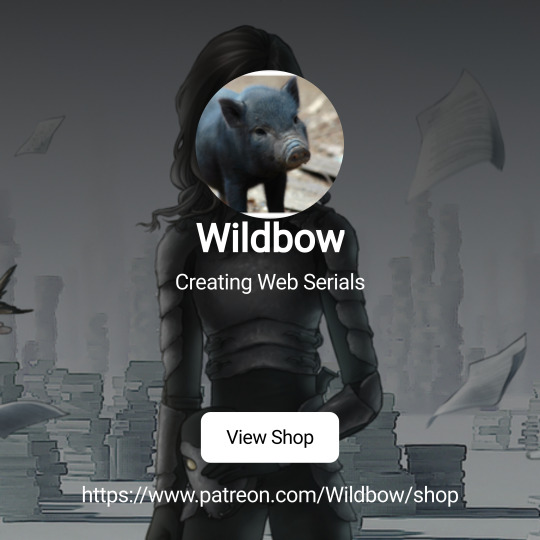
The Pace of Output: This is probably low-hanging fruit, but it is genuinely impressive that Wildbow wrote Worm as quickly as he did, sticking to a schedule as consistently as he did. I am in awe. I think even if I didn't have to work at all, and was able to write all the time, I wouldn't even be able to match half of what he did in the same amount of time, in terms of output. Wildbow accomplished something that is genuinely amazing here.
The Shards, Entities and Powers: Shard mechanics are not my favorite thing about Worm. But the whole thing really does come together well. It's a pretty cohesive, pretty well directed power system to tell the story he wanted to tell. I don't consume much cape fiction, so I don't know what stuff beyond Marvel and DC are really like in terms of how powers work and how they all fit and service the story, but for Worm, the Shards work to tell the story he wants to tell, really well. I read and write mostly fantasy and sci-fi, and spend a lot of time in worldbuilding spaces dedicated to both, or have at least, and a lot of would be writers fall into the trap of trying to overdevelop the magic system or the rules for whatever crazy supertech their story has without really stopping to figure out how it fits for the story they want. That's generally not a great approach if the intent is to have a story, and not just a cool setting or a fun magic concept. Wildbow created a pretty cool system, and then managed to avoid the common trap of getting so attached to the power system and it's rules that it interfered with telling the story he wanted to tell. Instead, he built and bent the system with his story as the driving purpose, and kept it all cohesively working within that framework.
The Interludes: The Interludes are without a doubt some of the best shit in Worm, overall. The way he is able to convey so much about these characters in these cutaway scenes and expand the world and advance the story and develop ongoing themes and narratives? Nearly every Interlude is doing like, 4 things at once, I swear to got, and the way he juggles that all together is awesome, and the end result is great. I will never go back and reread all of Worm from start to finish. But I will sure as shit go back and read some of the interludes just for the sheer fun of it. The way these cutaways manage to get you inside the head of these people, see their perspective is really good, takes real skill to make you go 'I really kinda see Saint's POV here' for his Interlude, for instance. Really good.
Amy Dallon: So like, I think it's clear I love Amy. She's fascinating. I have big feelings about her, and she's a divisive as fuck character. But Amy Dallon is the most fascinating character in Worm for me personally and she's genuinely one of the most fascinating characters in anything I've read. I'll have more to say about Amy if I manage to get a version of that Amy retrospective I'm happy with written, but unironically? Wildbow, thank you for writing Amy Dallon. I bitch about how much she's taken over my brain, but Amy is such a fascinating, interesting, enjoyable and engrossing character that she has been a net positive for me. Reading Worm and reading about her has enriched my life. Thank you. You did a damn good job with her in Worm, Wildbow.
Taylor Hebert: As I said back in Part 1 of this retrospective, I was worried I'd find Taylor insufferable. Her capacity for self-rationalization should be an issue for me. It often can be in other characters. But Wildbow managed to write Taylor amazingly. He created a character who is multifaceted, multilayered, complex, nuanced and yet, pretty simple. She's intensely relatable, and yet, she is also deeply, deeply alien and abnormal. She does absolutely insane shit, and yet, when you're reading along with her POV, so much of what she does and thinks makes her seem like the only sane woman in the room. Even when you take a step back and realize what she does, she's very hard to not like. Even if you want to grab her by the shoulders and shake some sense into her, you like her. She's great. She's an everywoman, she's no woman. She's clever and stupid and brilliant and unimaginative all at once. She is... She's Taylor Hebert. She's an antihero, a villain protagonist, a hero hero and... she's just some fucking girl.
Heroes/Villains: What I mean by this bulletpoint is - villain protagonists, making villainous characters sympathetic - that's easy enough to do. And making the 'official heroes' of a setting not really as great as they might seem is also fairly easy to do. But it is hard to pair the two together as well as Wildbow did. The Undersiders do a lot of bad things (I would disagree with people who say they're all *fundamentally* bad people - even Regent... ish, kinda sorta. He's so fucked up due to his background that calling him fundamentally bad is probably not really accurate. Though some people draw red lines around some of what he did, so that's more subjective. But like, the key thing is that he did that while *also* still making them pretty sympathetic without like... running protag-centered morality and still making them have done quite a bit of good (and a ton of bad) AND the handling of the heroes. Because it really does look a lot like he's doing a bit where the 'official heroes' are the real bad guys of the story between things like Armsmaster's shit and Interlude 2, but he also doesn't actually do that. And he executes it in a way that is really well done, without doing the thing where the narrative acts like someone is evil but like... the person isn't.
This isn't really an exhaustive list of 'everything Worm did well' or even 'Everything I liked about Worm', but it is stuff that Wildbow did really fucking well, that I really liked or am impressed with, and that he deserves unalloyed praise for.
There are reasons why I kept reading Worm, and those are some of the reasons.
(There could also be a point on how he manages the readers' information diet, but it's really hard to say for sure if it's something that I really liked because I came in so thoroughly spoiled. From what I can see, I think I would have liked it and given it the unalloyed praise normally, but it's impossible to say because I knew what 75% of these clues were ahead of time).
Mr. Bow - you did a lot of shit I don't like. But holy motherfucking shit, you did some goddamn amazing stuff too.
#Okay I've Read Worm: A Retrospective#Worm Web Serial#Wormblr#Worm Parahumans#Worm Wildbow#Kylia Reflects on Worm
34 notes
·
View notes
Text
Delulu moment of the day and we're back

OMG! I miss Tyler so much and I decided to share some thoughts about him. Let's assess?
(They put him shirtless for some reason... and somehow it worked! lol)

I was wondering why he didn't trigger her visions before the kiss. Tyler had touched her many times. But it was said her visions are unpredictable and according to Xavier, it was activated by her emotions, but how she doesn't know how to deal with them, they were unreliable and uncertain. It's funny because all of her vision were true. Xavier mansplained her powers for nothing. I guess they wanted to convey that she was aware of her emotions, her feelings and herself, but people misjudged her. The only foreign emotion she didn't know what do with was when she started to be around Enid and Tyler because Enid wants to be her bestie and Tyler was helping her without anything in return. She liked Eugene since their first meeting. Anyway… let's get back to the main point…

But there was ONE moment he triggered her a vision before the kiss: at the Rave'n. After the fake-blood rain, she touched his back and he got the vision of Eugene being attacked. NOW hear me out: AT THIS VERY MOMENT, Tyler was distracted. He was trying to figure out what was going on. Keep this piece of information!
Ok. I know you love this gif of shirtless Tyler but I had some reason to bring it. Stay with me. THIS WAY A HUGE OPPORTUNITY TO TRIGGER HER VISION: she was worried and nervous because she almost got him killed and he was nervous as well lol
Then I tried to remind every person who triggered her a vision: Rowan, the man who called her a freak, Garret Gates's finger lol and Tyler. All those people represented danger to Wednesday.

Then we have the kiss. People can deny how much they want, but, for the first time, she was fully conscious of her feelings and she felt confident about going at the Weathervane and being more than friend with Tyler. Dude, it's not me creating narratives. IT'S THERE! WE HAVE THE SCENES! I got pissed when peoople say she went there forced because she owed him ??? WHAT?? What kind of help did Tyler give to help her to solve the mystery? At that point, he was misleading her investigation! What kind of help is that? 'oh but she went there because Enid pushed her…' Are you telling me that Wednesday Addams walked 25 minutes because someone implied to her to do something out of her zone comfort? OK LMFAO I'm not saying she was in love with him, I'm telling you that she wanted experimenting something new with someone she was comfortable with and someone who SHE TRUSTED. Ok, but it's not the point…. Let's get back to the kiss…
When she steps forward to kiss him and then they break apart, and Tyler looks touched by her move, I implied he was triggered her a vision because he had put his guard off. He was not faking anything or lying, he was just living that moment. He just WANTED to kiss her and he got distracted again - SAME AT THE RAVE'N. FOR ME, they hinted that Tyler had feelings for her. It was a vulnerable moment for him because he was not expecting she returned his feelings. They had feelings for each other at that point and they wanted to be more than friends to another . Is that difficult to understand? That's the context they wanted to convey!

So yes, I believe all the moments he was supposed to trigger her a vision (it kills me he had many opportunities to touch her and nothing happened) before the kiss, it was because he was really hiding his secret counciounly aware and manipulating the environment. That's the part which I think Laurel's order was to hide his secret and to get to know what Wednesday was up to. BUT OF COURSE she realized he was very much involved with Wednesday when she saw them at the RAVEN' and decided to use his feelings in her benefit.

What you guys think? Please let me know!
Oh and if you use my post again to attack my ship or my theories, please mention me because I had to do all the dirty work here writing and searching. No, I'm not angry, but this is freaking TV SHOW. Don't take it too serious!
#weyler#wyler#wednesday x tyler#tyler x wednesday#tyler galpin#wednesday addams#wednesday netflix#tyler and wednesday#tyler wednesday
22 notes
·
View notes
Text
I just finished watching book 3 of The Legend of Korra. Here’s my top 5 things I hated the most about it:
caveat: I actually didn’t hate this season at all, I just wanted to continue this series
5. Poof! The genocide’s gone!
Let me preface this by saying that I thought that the storyline of Korra finding the airbenders was a nice change of pace and scenery and I enjoyed watching it. However, the bare-bones of this plotline are rotten for me.
ATLA treating the air nomad genocide with so much realism and severity is one of the greatest aspects of the show. Sure, this is a tv show for kids, but it’s still a fairly realistic portrayal of a victim of ethnic cleansing dealing with their trauma. We saw Aang searching for other air nomads, seeing his temples being destroyed, having to burn the last intact artifact made by his people (the staff), and the entire 4 part finale of the series revolves around Aang deciding that he is not willing to sacrifice his cultural and religious beliefs under any circumstances. On account of this, it truly shocked me that TLOK treats the air nomad genocide in the same way that Oprah approached her car giveaway:

The insistence that the air nomad genocide is something that the avatar could fix unintentionally conveys that Aang failed to fix it. Maybe if Aang had connected with Raava and meditated in the tree of time, he would’ve brought his people back- the narrative is saying. And I find that incredibly mean-spirited, regardless of whether it was intentional or not.
Aang died at 66 years of age, he never met any other airbenders after the genocide other than his own son; And TLOK killed Aang once again in season 2, so now he will never get to see the air nation’s rebirth. I know that this is a show about Korra, but I find this storyline to be not only an extremely immature way to treat a genocide (genocides can’t be “fixed”, bryke) but also a cruel insult to the protagonist of this universe.
4. Why the fuck is Varrick still here
Let me get this straight: Varrick took advantage of Unalaq’s colonialism to make himself rich. He bombed the Southern Water Tribe Cultural Center in order to incite a war between the tribes. He stole all of the weaponry made by Asami’s company and delivered it to the Northern Water Tribe so that they could use it to wipe out the SWT. He incriminated Mako, a 19 year old, so that he would take the blame for Varrick’s transgressions and spend his life in prison as a result. He manipulated and took advantage of Asami, another 19 year old. And many more crimes that I’m too tired to list.
So why is he in this season as a lovable sidekick? He escaped justice, Suyin yielded him, and when Lin understandably gets angry about that, Suyin tells her that Varrick shouldn’t be punished for his entire life just for a mistake. This isn’t Suyin talking to Lin, it’s the writers talking to the audience- they want us to forgive Varrick and accept him as our new sweet funny guy.
That makes me nauseous.
This is the sequel of a show about the dangers of colonization and imperialism. Why, why, why, WHY is the guy who aided colonization efforts the character that you want the audience to love? In moments like this, you can tell that this show was made by 2 white American men.
3. Mary Sueyin (Thanks for the pun!)
This already has been discussed ad nauseam. Suyin yielded a war criminal from facing justice, she also sent out the one person the Red Lotus wanted to capture and kill after them for her own vengeful reasons. The narrative never addresses this and continues to paint her as a flawless hero. It’s disconcerting.
2. Zaheer the Master
Sorry, I refuse to believe that a man who got his airbending powers just a couple of weeks ago is suddenly the greatest airbender in a millennium because he read some books.
Bumi: How can he fly like that?
Tenzin: He's unlocked powers of airbending that haven't existed for thousands of years.
Fuck off, writers. Fuck all the way off.
1. The torture porn
We didn’t need to see Korra getting tortured for so long in such graphic detail. I don’t want to accuse anyone of sexism, but I’m certain that these writers would’ve never treated Aang this way.
Overall pretty good season, 8/10.
#anti bryke#tlok critical#anti lok#lok critical#pro aang#look at me making a pro aang post! my versatility#anti varrick#anti suyin beifong#harmonic convergence#such a stupid fucking name
25 notes
·
View notes
Text
The Character of Sauron
Just finished watching S2 of Rings of Power. As a fan of the Jackson LOTR trilogy, and lukewarm-to-negative on the Jackson Hobbit, I wasn't sure to what extent RoP was necessary [the TV series is intended to mesh visually with the Jackson LOTR trilogy but Jackson is not involved with RoP]. Do we really need the world-building backstory fleshed out in detail? But I've been watching, and enjoying, and I think it's doing one thing exceptionally well that does indeed add richness to the overall LOTR story: it's showing us why Sauron is scary as fuck, how he came to be the nearly-unstoppable force that he is.
[Caveat: I read the Appendices once, literal decades ago. They are not fresh in my mind, so I don't know how much liberty RoP is taking with them. Probably a lot, because they're building narrative out of what is functionally academic material. But the LOTR films took a lot of liberties with the books as well, it's just a thing that's going to happen in adaptations, and the real question is whether or not the liberties lend themselves to a good and cohesive story. Anyway.]
Big ol' Rings of Power spoilers to follow.
So, Sauron. In LOTR he is presented as this immensely powerful, mystical being who corrupts and consumes. But it's kinda abstract. He's a burning eye; he uses the palantir and the Ring to get into people's heads somehow or other; his One Ring is bad for you, don't use it.
What RoP is doing is showing how Sauron gets into people's heads and manipulates them. He figures out what your ambition is, what your desires are, and uses them against you to further his own goals. For Galadriel, it's revenge. For Celebrimbor, it's acclaim as a legendary craftsman. And at first, Sauron has to interact with someone personally to suss out what it is they want, and how he can use that for his own advantage.
But then he figures out that he can put his own essence into these exquisite rings that Celebrimbor is crafting, and then use the rings as conduits to manipulate people from afar: he's able to warp King Durin's mind remotely, pushing him into physically attacking his fellow dwarves. The more of Sauron's essence that goes into the rings, the more easily he can use them as vessels, and he escalates accordingly with the rings for men. The rings that will ultimately turn those men into his nazgul servants, their own will utterly subsumed into his.
I also appreciate how the writers have shown that Sauron can *appear* sympathetic, but are not actually portraying him as a Poor Misunderstood Villain in the narrative. In S1 we, like Galadriel, are fully led to believe Halbrand is basically a good guy, a bit of a rake with a mysterious past. Until we find out the truth about who Halbrand really is and, whoops! We were *deceived.*
The way Sauron shifts back and forth between kind and cruel indicates there's no underlying attempt to rehabilitate him as a character, but rather to show just how cunning manipulators can be at their craft. Even after the other characters *know* who he is, they still have a hard time resisting him. This persists for Galadriel for 3000 years, culminating in her immense relief when Frodo offers her the One Ring and she's able to turn him down, albeit with some effort. If the Hobbits have special resistance to his wiles, perhaps it's because their ambitions and desires tend to be "eat a food, drink an ale, smoke a blunt."
The actor playing Sauron (Charlie Vickers) is IMO doing a *fantastic* job of shifting from "I'm just a mostly-wholesome person who's here to help you do the thing you need to do" to "I'm absolutely using your desires to manipulate you into doing the thing *I* want to do," his expression gliding from warm to cold as Sauron shifts modes. The way a very slight twitch of a facial muscle conveys Sauron's anger without devolving into chewing scenery or over-the-top bombast. Sauron does commit acts of violence, but by far his preferred go-to is getting others to do his dirty work for him, and he almost always gets people to go along with him willingly, even against their own best interests. Far more scary than a guy who just yells a lot and stabs people.
24 notes
·
View notes